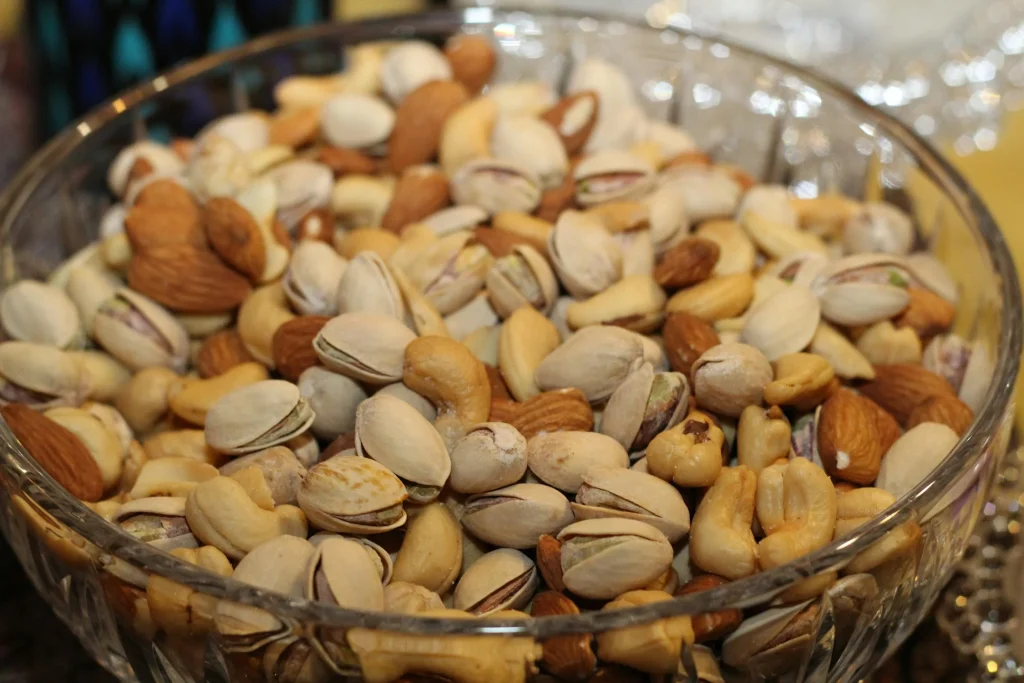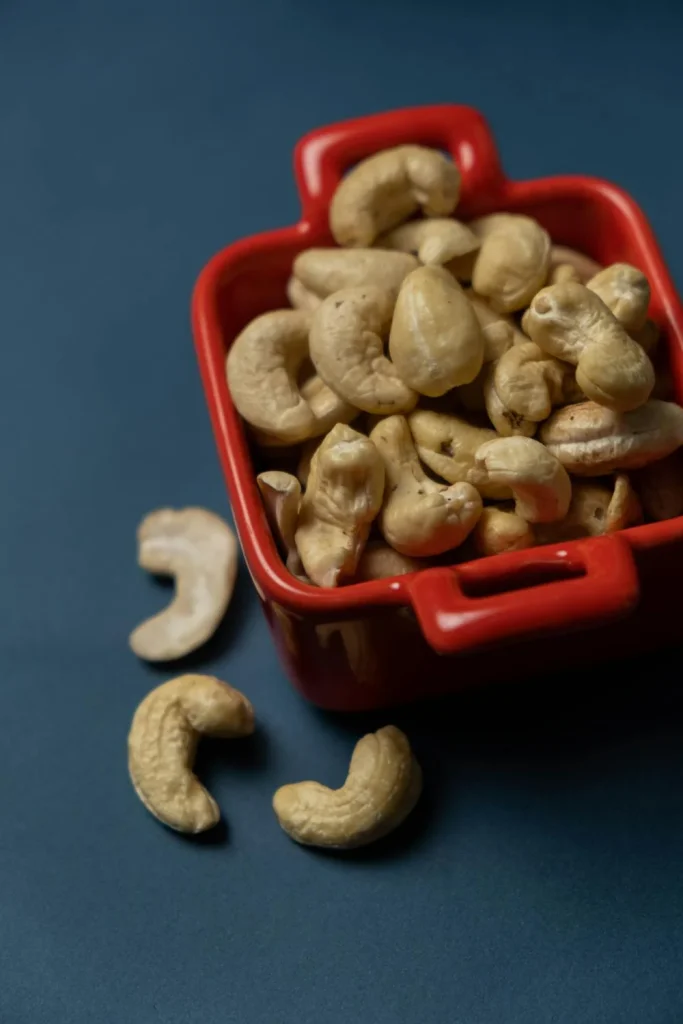What are nuts and types?
Nuts are nutrient-dense seeds encased in hard shells, packed with protein, healthy fats, and various vitamins and minerals. Common types include almonds, walnuts, pecans, cashews, pistachios, macadamias, and hazelnuts. Each variety offers unique flavors and nutritional profiles. Nuts are versatile ingredients used in cooking, baking, and snacking. They’re popular in both sweet and savory dishes, from desserts to salads.

Some nuts, like peanuts, are technically legumes but are often grouped with tree nuts due to similar culinary uses and nutritional content. Nuts have been consumed by humans for thousands of years and remain a staple in many diets worldwide. Their crunchy texture and rich taste make them a favorite snack for many, while their nutritional benefits have made them increasingly popular in health-conscious diets.
Is there a relation between cats and nuts?
Cats are obligate carnivores, meaning their bodies are designed to digest and use animal-based proteins efficiently. Unlike humans, cats don’t have a nutritional requirement for plant-based foods like nuts. Their digestive systems aren’t well-equipped to process these foods. While some cats might show curiosity towards nuts due to their crunchy texture or enticing smell, it’s important to remember that a cat’s natural diet consists primarily of meat. Read Also can cats eat popcorns
Nuts don’t provide the essential nutrients cats need for optimal health, and some nuts can even be harmful to our feline friends. In nature, cats would never seek out nuts as a food source.
Can cats eat nuts?
The short answer is that it’s generally not recommended for cats to eat nuts. While some nuts aren’t toxic to cats, they don’t offer any nutritional benefits and can pose potential risks. Nuts are high in fats, which can lead to digestive upset and even pancreatitis in cats if consumed in large quantities. Additionally, the hard texture of nuts can be a choking hazard or cause intestinal blockages, especially in smaller cats.
Some nuts, like macadamia nuts, are toxic to cats and should be strictly avoided. It’s always best to stick to a balanced, species-appropriate diet for your feline companion and consult with a veterinarian before introducing any new foods. Cats have specific dietary needs that are best met through their regular cat food.
Benefits of nuts for cats
Protein Source
Do you know that nuts are often praised for their protein content? However, when it comes to cats, the protein in nuts isn’t as beneficial as you might think. Cats require animal-based proteins that contain essential amino acids their bodies can’t produce. While nuts do contain some protein, it’s not the complete protein cats need. Read Also can cats eat bamboo
Additionally, the plant-based proteins in nuts are harder for cats to digest and utilize effectively. In fact, feeding cats large amounts of plant proteins can potentially lead to digestive issues and nutritional imbalances. It’s crucial to remember that cats are obligate carnivores, and their bodies are designed to thrive on animal-based proteins found in meat, fish, and poultry. Therefore, while nuts may be a good protein source for humans, they’re not suitable for meeting a cat’s protein requirements.
Healthy Fats
We were shocked to learn that while nuts are known for their healthy fats, these aren’t necessarily beneficial for cats. Cats have different fat requirements compared to humans. The fats found in nuts, such as omega-3 and omega-6 fatty acids, are indeed important for cats, but they’re better obtained from animal sources like fish oil. The high fat content in nuts can actually be problematic for cats, potentially leading to weight gain and digestive issues if consumed in large quantities.
Moreover, some cats may have difficulty digesting plant-based fats efficiently. It’s important to note that cats can get all the healthy fats they need from a properly balanced commercial cat food or from animal-based fat sources recommended by a veterinarian. So, while nuts are a great source of healthy fats for humans, they’re not ideal for cats.
Vitamins and Minerals
Now, after discussing proteins and fats, let’s talk about the vitamins and minerals in nuts. Nuts are packed with various micronutrients that are beneficial for humans, but cats have different nutritional needs. For instance, nuts contain vitamin E, which is an important antioxidant for cats. However, cats can obtain sufficient vitamin E from their regular diet, including commercial cat foods fortified with this nutrient.
Some nuts also contain minerals like magnesium and potassium, which are essential for cats. But again, these minerals are already present in appropriate amounts in a balanced cat diet. In fact, excessive intake of certain minerals from nuts could potentially disrupt the delicate nutrient balance in a cat’s body. It’s always best to rely on specially formulated cat food to meet your feline friend’s vitamin and mineral needs.
Fiber Content
In the previous sections, we discussed various aspects of nuts, but we haven’t touched on fiber yet. Nuts do contain dietary fiber, which is often touted as beneficial for digestive health in humans. However, cats have a short digestive tract designed for processing meat, not plant matter. While a small amount of fiber can be beneficial for cats, particularly those with certain digestive issues, the fiber in nuts isn’t necessary for a healthy feline diet.
Too much fiber from sources like nuts can actually cause digestive upset in cats, leading to symptoms such as diarrhea or constipation. If a cat requires additional fiber in their diet, it’s best to consult with a veterinarian who can recommend appropriate fiber sources specifically formulated for feline needs. Remember, a cat’s digestive system is quite different from ours, and what’s beneficial for us may not be for them.
How much nuts for a cat (different types with their amount)
As we discussed previously, nuts are not a recommended part of a cat’s diet. However, if you’re considering offering a tiny amount as an occasional treat, here are some guidelines:
- Almonds: No more than 1/4 of a single almond, once a week.
- Cashews: A tiny piece, about 1/8 of a cashew, once a month.
- Peanuts (unsalted): 1/4 of a peanut, once every two weeks.
- Pistachios: Avoid completely due to high salt content.
- Walnuts: A small fragment, about 1/8 of a walnut, once a month.
- Pecans: A tiny piece, about 1/6 of a pecan, once a month.
- Hazelnuts: A small fragment, about 1/8 of a hazelnut, once a month.
Remember, these amounts are extremely small and should not be given regularly. It’s always best to consult with your veterinarian before introducing any new foods to your cat’s diet.
Which nut is most safe for cats?
Next, let’s talk about which nut is most safe for cats. While no nut is truly “safe” for cats, some are less problematic than others. Cashews are often considered one of the least harmful nuts for cats in very small quantities. They’re not toxic and are softer than many other nuts, reducing the risk of choking. However, this doesn’t mean cashews are good for cats.

They’re still high in fat and can cause digestive upset. It’s important to remember that even the “safest” nut is not a necessary or beneficial part of a cat’s diet. If you’re looking for safe treats for your cat, it’s best to stick with commercial cat treats or small pieces of cooked meat.
Which nut is harmful to cats?
Finally, we need to address which nuts are harmful to cats. Macadamia nuts are known to be toxic to cats and should be strictly avoided. Even small amounts can cause weakness, depression, vomiting, hyperthermia, and tremors in cats. Other nuts to be particularly cautious about include almonds and walnuts. Almonds contain cyanide, which is toxic to cats, while walnuts can cause gastric intestinal upset and even seizures. Read Also can cats eat mango
Pecans and pistachios are also problematic due to their high fat content and potential mold contamination. We have to use extreme caution with all nuts, as their high fat content can lead to pancreatitis in cats, a serious and potentially life-threatening condition. It’s always safer to avoid giving nuts to cats altogether.
FAQ Section
Can cats eat pistachio nuts?
First, it’s important to understand that pistachios aren’t recommended for cats. While not as toxic as some other nuts, they pose several risks. Pistachios are high in fat, which can lead to digestive upset and potentially contribute to obesity in cats. Moreover, the salt content in most commercially available pistachios is harmful to cats. There’s also a risk of choking or intestinal blockage, especially if the cat swallows the shell. If your curious kitty manages to snag a pistachio, don’t panic, but do monitor them closely for any signs of distress. As we’ve discussed previously, it’s always best to stick to cat-specific treats and foods.
Can cats eat cashew nuts?
Now, after discussing pistachios, let’s address cashews. While cashews aren’t toxic to cats, they’re not an ideal treat. Cashews are high in fat, which can upset a cat’s digestive system and potentially lead to pancreatitis if consumed in large quantities. They also don’t provide any nutritional benefits that cats can’t get from their regular diet. If your cat happens to eat a small piece of cashew, it’s unlikely to cause serious harm, but it shouldn’t become a habit. Remember, cats are obligate carnivores, and their bodies are designed to process meat, not nuts. As always, it’s best to consult with your vet before introducing any new foods to your cat’s diet.
Can cats eat macadamia nuts?
Do you know that macadamia nuts are one of the most dangerous nuts for cats? We were shocked to learn about the severe effects these nuts can have on our feline friends. Macadamia nuts are highly toxic to cats and should be strictly avoided. Even small amounts can cause serious symptoms including weakness, depression, vomiting, hyperthermia, and tremors. If you suspect your cat has eaten macadamia nuts, it’s crucial to contact your veterinarian immediately. This is why it’s so important to keep all nuts, especially macadamias, safely out of reach of your curious cat. Always prioritize your cat’s safety and stick to cat-appropriate treats.
What should I do if my cat eats nuts?
If you find that your cat has eaten nuts, the first step is to stay calm. The severity of the situation depends on the type and amount of nuts consumed. If it’s just a small amount of a non-toxic nut like a cashew, monitor your cat closely for any signs of digestive upset. However, if your cat has eaten a toxic nut like macadamia, or a large quantity of any type of nut, it’s best to contact your veterinarian immediately. They may advise you to bring your cat in for examination or to induce vomiting at home. Remember, it’s always better to err on the side of caution when it comes to your pet’s health. In the future, we recommend keeping all nuts safely stored away from your curious feline to prevent any accidental ingestion.
Read Also


